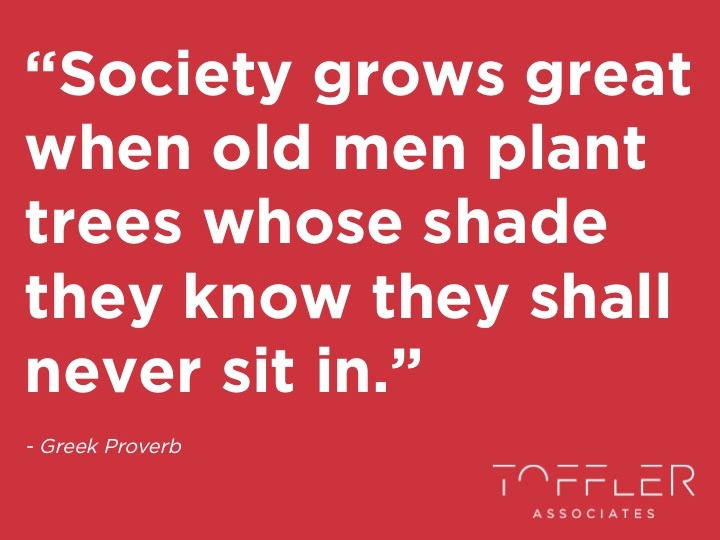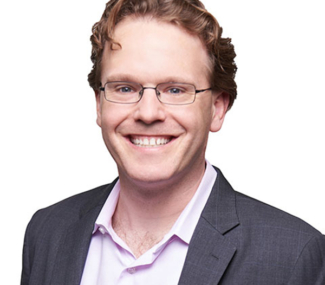This is Why Your Organizational Transformation Demands Humanity

In March 2016, my wife and I welcomed our first child. Needless to say, it was a big change for us. As I enjoyed time off with my new family, I had ample time to reflect on transformation and the significance of change for individuals, organizations, and societies.
Much of my work at Toffler Associates involves helping corporations, government agencies, and other entities define and execute organizational transformations. Essentially, I think about change a lot in my job. In the months since becoming a parent, the idea of change and what it takes to thrive throughout a transformation has taken on a different perspective – and greater significance.
Change is a human challenge, and it’s ever more clear that the world is struggling with transitions wrought by globalization and the Knowledge Age. At Toffler, we see three particularly notable issues impacting the process and outcomes of modern transformation. The issues are true at the personal, organizational, and global levels. They are: Trust, Winners and Losers, and Purpose.
Trust
Trust is an inherently complex concept. You can earn it. You also can lose it. It’s a noun and a verb – it’s our assurance in the veracity of something or someone else, and it’s also the choice we make to build that certainty. Trust is a feeling of stability or security; it binds organizations together. As change accelerates, we have to decide if, how, and how much to trust individuals, organizations, governments, and even machines.
For example, consider the reliance we put on wearables and implanted biodigital devices. Not only do we rely on the device to improve our health, but we trust that a threat actor won’t hack into the device, and we expect that our doctors will use our most personal data to help us.
Winners & Losers
We all know that every change produces winners and it produces losers. Some people might gain responsibility; others might lose a job. Whether the context is a major geopolitical powershift such as a presidential election or Brexit vote, or a leadership change within your organization, it’s vital to acknowledge fall out with empathy, fairness, and authenticity.
How you respond likely will determine your ability to continue operations. Genuine recognition of the downsides of a change is important for sustaining productive relationships with those who might have ‘lost’ but who likely made worthy contributions at other times. It’s also important for maintaining control of the balance of the community that has been altered during the transformation process so that those who remain can understand what has happened, why, and how they play a role in the future.
Purpose
It’s human nature to avoid change or try to adapt our environment instead of our self. Yet successful organizations are in a perpetual state of change. They recognize that it is better to adapt on the rise than on the fall. They know that there is more significance in changing for something rather than because of something.
 The distinction between ‘for’ and ‘because of’ goes deep (i.e., we do great things “for our children” but we take out the trash “because we have to”). The intrinsic value lies not in the instructions we’re given, but in the fulfillment we derive from the effort.
The distinction between ‘for’ and ‘because of’ goes deep (i.e., we do great things “for our children” but we take out the trash “because we have to”). The intrinsic value lies not in the instructions we’re given, but in the fulfillment we derive from the effort.
During times of change, great leaders ensure teams and individuals understand they are putting in significant effort and sustaining wins or losses as part of a meaningful transformation.
The value of a shared and higher objective is what often prompts us to work outside the comfort zone to make change where it is needed most in the world. For example, it is what compels groups to battle to control critical infrastructures like water or agriculture, knowing the results of the endeavor may not be seen for generations.
Transformation is a cycle that requires trust, balance, and purpose. Regardless of the source of change, the implications demand leaders who earn trust as a result of genuine courage and integrity. Balancing the strategic, tactical, and cultural details requires that leaders be equipped to understand, plan, and adapt to the evolving situation. With the right resources in place, you have the power to plant seeds for lasting positive impact.
It’s time to take a moment from thinking about strategy to consider the human implications of your decisions and actions.
{{cta(‘c254ce44-075c-42d8-8fb5-4887c026f5c7’)}}
- Categories
- Leadership
- Workforce of the Future

 About the Authors
About the Authors